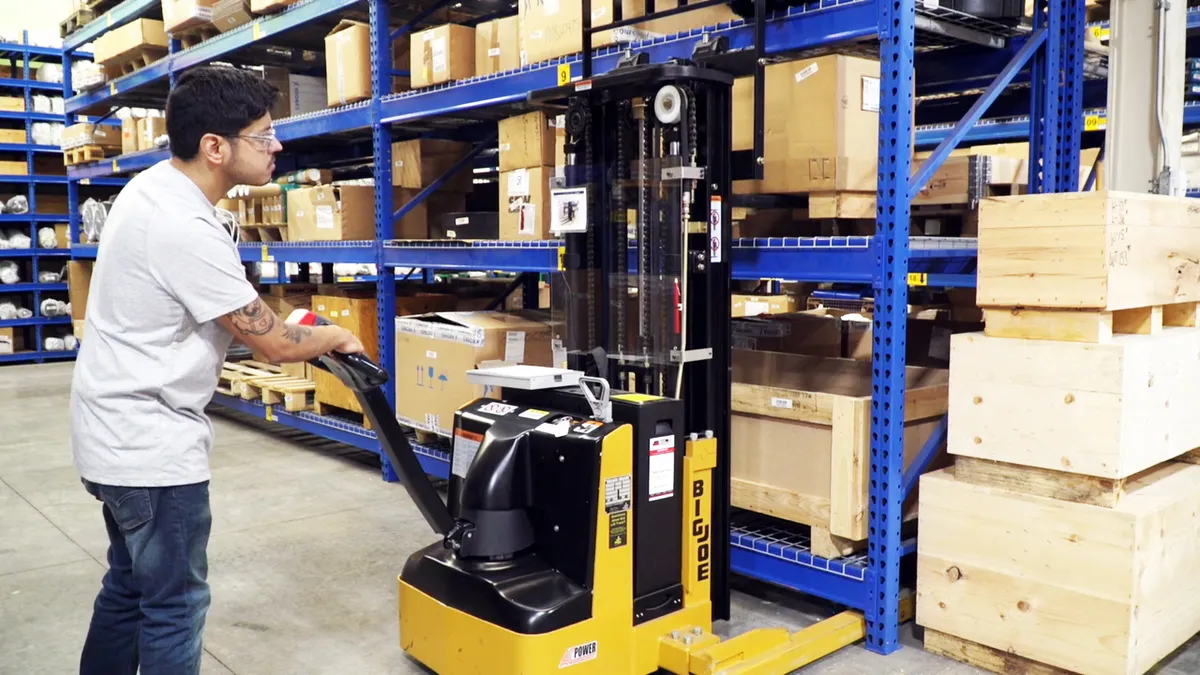Forklifts are the workhorse of the warehouse. There’s no denying their importance, but not all forklifts are created equally. While traditional sit-down counterbalance forklifts excel at lifting heavy loads to high heights and are an easy solution for moving goods in the warehouse, they are not the only option available.
Where sit-down counterbalance forklifts can be expensive, particularly if powered by an internal combustion engine, and require a lot of upkeep, electric walk-behind forklifts or “walkies” are the complete opposite of that in almost every way.
Walkies are ideal for any size facility as a one-truck solution or as a supplemental piece of equipment in larger facilities. They offer additional flexibility in tight spaces that can streamline processes and create efficiencies due to their low overall fleet costs. Plus, walkies that are powered with lithium-ion batteries are even more efficient, offering all the benefits of traditional walkies without all the maintenance and financial pains associated with traditional lead acid batteries.
“Big Joe has positioned itself in the market as a manufacturer that provides solutions where nobody else can,” says Kurt Spyke, director of national accounts and strategic product for Big Joe Forklifts. “We make the application specific solutions that do very specialized assignments and tasks all throughout facilities.”
The flexibility of walkies is filling gaps in the warehouse
Many warehouses today use traditional sit-down counterbalance forklifts for almost every task in the warehouse. But, just because they can do the task, doesn’t mean it’s the right tool for the job.
“We take the time to meet customers at their facilities and say, ‘ Why are you using these expensive sit-down counterbalance forklifts for everything if many of your applications don’t require you to lift heavy loads up high?” says Spyke. “You don't need to use that extremely expensive solution when we have a solution that will accomplish the same job at one-third the price.
Getting around the mentality of “that’s the way we’ve always done it” can be a challenge, but application specific walkies are here to fill the gaps in the warehouse that still need to be solved.
“The question we ask most is, ‘Why are you using that?” says Spyke. “‘Because that's what we bought before. Historically speaking, that's all we ever bought.’ It doesn't make it wrong, but we're trying to open consumers’ eyes to, yeah, it's not wrong, but there might be a better way to do it.”
Big Joe walkies provide similar or the same capabilities as larger materials handling equipment but at significantly less cost and within a smaller footprint. Some Big Joe solution can reach heights in excess of 189” along with pantograph reach capabilities. Walkies also excel at managing light-to-medium loads around very tight spaces, especially loading docks or areas where a counterbalanced forklift won’t fit.
Walkie Stackers are designed to streamline the loading and unloading of trailers, and they are ideal in a warehouse or retail setting from ground level when a dock or lift gate is unavailable.
Walkies don’t need to replace your more traditional materials handling equipment either. They can be used in tandem with forklifts, especially in distribution settings where space is an issue. While forklifts excel at heaving lifting and high-speed travel, electric walkies can be more effective for shorter or more frequent trips, giving you more options to get the job done efficiently and at the lowest cost possible.
Cost-effective alternative for small businesses
Why buy something more expensive when you can do the same thing with equipment that costs less. Seems like a simple enough concept, but it’s the ongoing reality of the forklift market today.
Walkies not only cost less upfront than traditional sit-down counterbalance forklifts, but they are cheaper to operate and maintain. Powered by lithium-ion batteries, electric walkies save on fuel and create further cost-saving efficiencies thanks to fewer maintenance needs and less downtime.
“If something is being worked on, it's not making anybody money, and don't tell anybody, but forklifts are pure overhead,” says Spyke.
With an estimated 80% of vehicle costs tied up in maintenance, lithium-ion-powered equipment offers a compelling alternative. Lithium-ion batteries charge faster, last longer and allow you to use your equipment all the time without worrying about it being repaired or maintained.
“Longer runtime means more productivity,” says Spyke, adding that the expense of lithium-ion is no longer the challenge it once was as their use is becoming the industry standard.
Walkie stackers can also help drive efficiencies from a labor standpoint. Because walkie stackers like the Big Joe CB 30/35 and PDSR do not require operator certification, employees are able to get up and running quickly and with minimal training.
“Jobs are tough to fill…and putting a person on a big piece of equipment and operating it fast, efficiently and safely is so difficult,” says Spyke. “When you get somebody into an organization that's new, you can put a Big Joe piece of equipment in their hands, and we will train them so they are certified, so they are safe and they're ready to go. We'll have that operator up to speed doing their job so they can enjoy what they do for a living much faster.”
A simple solution to an increasingly complex warehouse
Traditional sit-down counterbalance forklifts will always have a place in the warehouse, but walkies are an excellent alternative to the status quo. Not only are the lifetime costs of walk-behind forklifts significantly lower than sit-down counterbalance forklifts, but they offer the additional benefits of sustainability, efficiency and ease of use.
“Big Joe has a better solution for you and we make it easy,” says Spyke. “We're not making this any more complicated than what it needs to be. You want stuff picked up, moved and put back down, over and over.. Well, we're going to do that at the lowest cost possible.”










